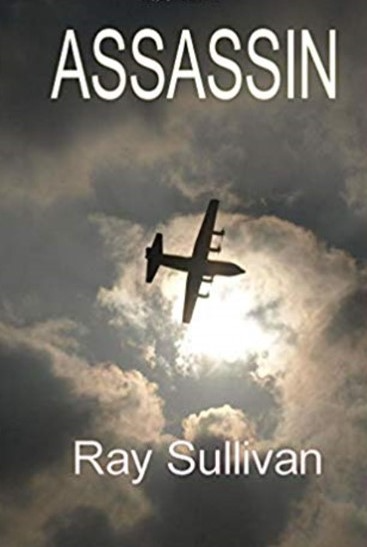Interview with Ray Sullivan
Author of Assassin
Ray Sullivan is a British author born and raised in north Wales. He completed a 24 year military career in the Royal Air Force before returning to north Wales to work in the public and private sector. Until he retired he was a lecturer in aeronautical engineering when not writing. Ray's writing is impossible to pidgeon-hole - his novels range from sci-fi, to military adventure to comedic. His latest book is Bronze, a murder mystery featuring an explosives ordnance disposal expert cum detective.
Buy this book
How would you describe Assassin to a new reader?
- Assassin is a dystopian novel set in a fairly near future, with two narratives intertwined throughout the book. The earlier story is about the events following the biggest terrorist attack on mainland UK, shortly after the government has suspended democracy to enable it to pursue the ongoing war on terror.
It follows the events that John, an engineer, experiences as he is first nearly killed, then debriefed by congress agents, a journey that sees his family slain and himself sucked into an underworld where he ends up as a killer for hire.
The other narrative is some years after those events and John is holed up in a beach hut during a terrible storm. He's with a beach bum who discovers John's profession and John ends up recounting his journey, unaware that congress agents are staking the hut out.
There follows a journey where John and the beach bum are pursued by congress agents as they make a dash for the Welsh border and relative safety.
The UK is broken up - was Brexit a catalyst for this?
- The UK I describe might sound to some like a future defined by Brexit, but this book was written long before Brexit was a concept, let alone a word. In the book the government has severed its ties from Europe, from the rest of the world in many ways. Scotland has become independent and Wales, although notionally independent is actually a vassal state.
It was influenced by successive UK governments attempting to water down civil liberties to help fight the war on terror. while I am a supporter of quashing terrorism, I feel that there is a fine balance where it is possible the measures designed to fight terrorists can actually help them achieve their aim of harming the general population.
Many of the ideas floated back in the day were abandoned or watered down, but I could see that if the measures being proposed were fully implemented then UK citizens would see a major erosion of democracy. That thought process led me to consider a UK that followed such a path. Throw in an alternative undemocratic government and a suitable plot, you've got a thriller on your hands.
A lot of the locations in Assassin seem to be based on real places, how authentic are they?
- In varying detail, and given that all the events are based on a future UK, many are very accurate to anyone who knows the locations.
The QE bridge that spans the Thames is a major feat of engineering. I had occasion to cross it a few times when working for a previous employer that had a major factory on the Kent side. Stuck in a rush hour traffic jam one summer evening I was amazed at the number of vehicles stationary on the bridge and, as one does, started to wonder if the designers had considered the effect of a major vehicle bomb on the bridge as it looked a massive terrorist target.
A lot of the action takes place in Chester, a historic city just down the road from where I was brought up and live. The major difference is that this Chester is in the future, some years after the Great Fire of Chester, an event that hasn't occurred yet, but in the book holds a significant part of the plot. I worked as a fire safety inspector in Chester for a few years and firmly believe that such a fire is likely in the future unless certain infrastructure improvements are made. I describe the devastation to a real, existing part of Chester in the book while casually destroying other parts. That's one of the fun things about being a writer - you can change future history, although I really hope I'm wrong on this one.
There's an important plot line based in a disused Outward Bound school near the Welsh town of Aberdovey. I attended that school back in the 1970s and it was there that I discovered my lifelong love of hill walking. It also exposed me to sports I've barely touched since - canoeing, abseiling, mountain climbing for example, but I've got fond memories of the place all these years later. I very much doubt if my recollection of the main buildings is accurate, but I would imagine anyone who attended courses there in its heyday would feel some authenticity.
What else did you enjoy adding to the storyline of Assassin
- If you've read any of my other books you'll know I'm a bit of a helicopter fan. I worked on a mix of fast jets and helicopters in my RAF days, but the helicopters are the devices that I enjoyed the most. I worked on Whirlwinds, Wessex and Chinook helicopters in my time and in other books I've used the Chinooks as part of the stories, but for this one I dragged up a venerable three seater Sioux helicopter to take centre stage. I haven't worked on this aircraft, but was in a position to donate one to the helicopter museum near Weston-Super-Mare Helicopter Museum in the 1990s, having found one rotting away under a tarpaulin while patrolling RAF Halton on guard duty. Writing it in felt like honouring an under appreciated vehicle from the past.
Synopsis
A tale of vengeance and pursuit in an age where values are distorted beyond recognition.John, an engineer, was a victim to the terrorist attack that destroyed the Queen Elizabeth the Second Bridge outside London and almost killed him with it.
While being debriefed by congress agents his family was targeted and killed by a mysterious person known only as Morris, which started a journey that resulted in John becoming a gun for hire, a dedicated killer known as the Assassin in a country that has separated itself from democracy and the rest of the world.
Some years later John finds himself holed up in a hut in Cornwall during a terrible storm with a beach bum who discovers John's secret. They are destined to spend the night stuck in each other's company while the storm plays out and John decides to tell his story of how he came to be ‘The Assassin’ as a way of proving he means his co-resident, Dave, no harm. Except Dave isn't all that he appears to be and unknown to both men there are congress soldiers staking out the hut, intent on killing one of them and capturing the other before the night is through.
As the night progresses, John's tale of his past unfolds as the present develops, and we find ourselves living his story alternately through his eyes and as a remote viewer as we discover how he took his vengeance on his family’s killer while being pursued by government agents intent on killing him. The story culminates in a dramatic chase as ground and airborne forces pursue John and Dave as they seek the ultimate sanctuary in an abandoned abbey on the English and Welsh borders.

